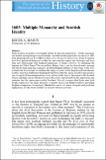Files in this item
1603 : multiple monarchy and Scottish identity
Item metadata
| dc.contributor.author | Mason, Roger | |
| dc.date.accessioned | 2020-06-18T09:30:06Z | |
| dc.date.available | 2020-06-18T09:30:06Z | |
| dc.date.issued | 2020-07-11 | |
| dc.identifier | 268228270 | |
| dc.identifier | feee0e97-377e-4830-918f-7dc958454804 | |
| dc.identifier | 000540705600001 | |
| dc.identifier | 85086579449 | |
| dc.identifier.citation | Mason , R 2020 , ' 1603 : multiple monarchy and Scottish identity ' , History , vol. 105 , no. 366 , pp. 402-421 . https://doi.org/10.1111/1468-229X.13014 | en |
| dc.identifier.issn | 0018-2648 | |
| dc.identifier.other | ORCID: /0000-0002-6801-4631/work/75996839 | |
| dc.identifier.uri | https://hdl.handle.net/10023/20099 | |
| dc.description.abstract | Early modern geopolitics were largely driven by dynastic imperatives – births, marriages and deaths among Europe's royal families – and this article approaches the union of 1603 from the perspective of J. H. Elliott's A Europe of Composite Monarchies . Thus, it explores how Scots perceived their place within this new dynastic empire and the hopes and fears their new relationship with England engendered. It begins, however, by examining the baptism in 1594 of James VI's son and heir, Prince Henry, and the clear dynastic message that the Scottish king was sending to his future English subjects. It then turns to the ways in which the Scots sought to celebrate the king's accession to the English and Irish thrones in 1603, ways that deliberately legitimised their belief that the union should be perceived as one of equals. It then examines four tracts written at the time of the union by the Scottish lawyer and legal scholar Thomas Craig of Riccarton that reveal both the aspirations and anxieties that the union generated in Scotland. Overall, it argues that Scots were both deeply sceptical of the king's plans for ‘complete’ union and deeply hostile to prevailing English assumptions of superiority. Rather they saw it as a union of equals with profound implications for the future stability of the new Stewart imperium. | |
| dc.format.extent | 20 | |
| dc.format.extent | 224890 | |
| dc.language.iso | eng | |
| dc.relation.ispartof | History | en |
| dc.subject | DA Great Britain | en |
| dc.subject | JN1187 Scotland | en |
| dc.subject | T-NDAS | en |
| dc.subject.lcc | DA | en |
| dc.subject.lcc | JN1187 | en |
| dc.title | 1603 : multiple monarchy and Scottish identity | en |
| dc.type | Journal article | en |
| dc.contributor.institution | University of St Andrews. School of History | en |
| dc.identifier.doi | 10.1111/1468-229X.13014 | |
| dc.description.status | Peer reviewed | en |
This item appears in the following Collection(s)
Items in the St Andrews Research Repository are protected by copyright, with all rights reserved, unless otherwise indicated.

